高中英语人教版必修四Unit1单词讲解-精选.pdf
- 格式:pdf
- 大小:4.24 MB
- 文档页数:27
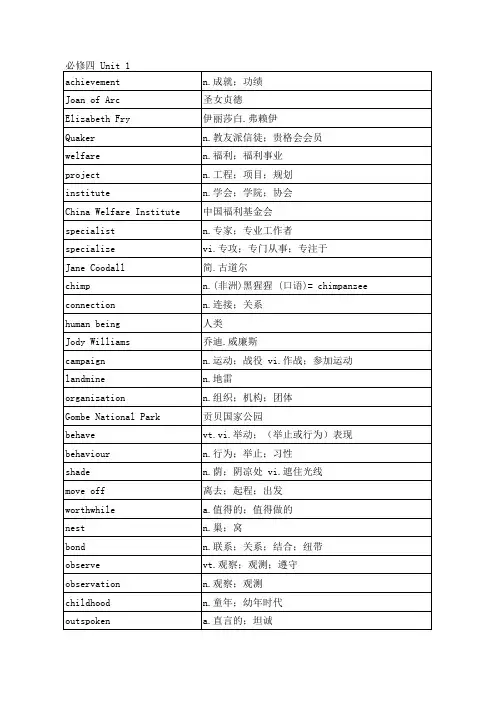


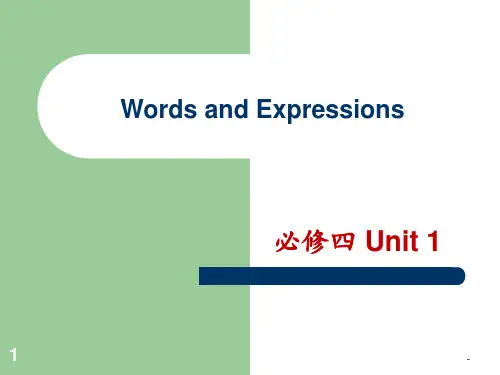
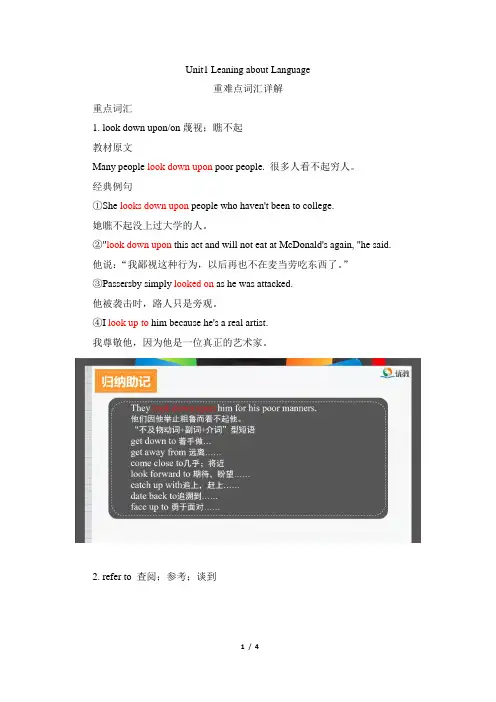
Unit1 Leaning about Language重难点词汇详解重点词汇1. look down upon/on蔑视;瞧不起教材原文Many people look down upon poor people. 很多人看不起穷人。
经典例句①She looks down upon people who haven't been to college.她瞧不起没上过大学的人。
②"look down upon this act and will not eat at McDonald's again, "he said. 他说:“我鄙视这种行为,以后再也不在麦当劳吃东西了。
”③Passersby simply looked on as he was attacked.他被袭击时,路人只是旁观。
④I look up to him because he's a real artist.我尊敬他,因为他是一位真正的艺术家。
2. refer to 查阅;参考;谈到教材原文If the word group refers to different members, use a plural verb. 如果单词“group”指不同成员,那么动词用复数形式。
经典例句①Don't refer to this matter again, please. 请不要再提这件事了。
②They referred to this kind of art as minimal art.他们把这种艺术叫作微型艺术。
③If he gives you any more trouble, refer him to me.如果他再找你麻烦,叫他来找我。
温馨提示refer的过去式和过去分词,以及现在分词都要双写字母r(referred/referring)。
结构详解1. seem 后面接动词不定式的用法seem to do 似乎做……seem后接动词不定式的用法seem to be doing 似乎正在做. ……seem to have done 似乎已经做了……教材原文The audience seem/seems to have enjoyed the concert. 观众们好像喜欢这场音乐会。

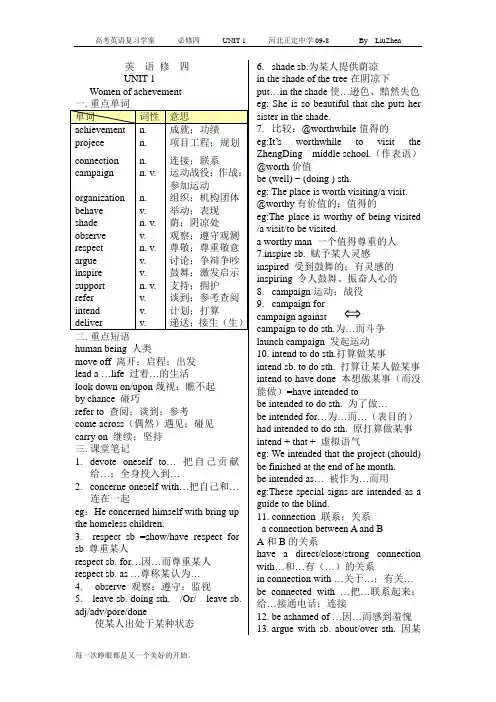
6. shade sb.为某人提供荫凉in the shade of the tree 在阴凉下put …in the shade 使…逊色、黯然失色 eg: She is so beautiful that she puts her sister in the shade.7. 比较:@worthwhile 值得的eg:It ’s worthwhile to visit the ZhengDing middle school.(作表语)@worth 价值be (well) ~ (doing ) sth.eg: The place is worth visiting/a visit.@worthy 有价值的;值得的eg:The place is worthy of being visited/a visit/to be visited.a worthy man 一个值得尊重的人7.inspire sb. 赋予某人灵感inspired 受到鼓舞的;有灵感的inspiring 令人鼓舞、振奋人心的8. campaign 运动;战役9. campaign forcampaign againstcampaign to do sth.为…而斗争launch campaign 发起运动10. intend to do sth.打算做某事intend sb. to do sth. 打算让某人做某事intend to have done 本想做某事(而没能做)=have intended tobe intended to do sth. 为了做…be intended for …为…而…(表目的)had intended to do sth. 原打算做某事intend + that + 虚拟语气eg: We intended that the project (should)be finished at the end of he month.be intended as … 被作为…而用eg:These special signs are intended as aguide to the blind.11. connection 联系;关系a connection between A and BA 和B 的关系have a direct/close/strong connectionwith …和…有(…)的关系in connection with …关于…;有关…be connected with …把…联系起来;给…接通电话;连接 12. be ashamed of …因…而感到羞愧13. argue with sb. about/over sth. 因某事和某人辩论argue that…主张,认为…argue for/against为支持/反对..而辩论argue sb. into/out of doing sth.说服某人做/不做某事14.work out 理解;说出;判断;发展进行;解出、算出;制定、拟定15.crowd in (on sb.)/crowd into one’smind/head 涌上心头、涌入脑海crowd into…大量涌入(狭小的空间)16.drive …out of …把…赶出…drive sb. to do 迫使某人去做某事drive sb.+adj/介词短语使某人…eg: You will drive me mad.17.marn sb. of/about…警告某人…warn sb. against+n./代词提防…别…warn sb. to/not to do sth. 告诫/提醒某人(不)做某事18.look down on/open…藐视,瞧不起.. look up to sb for sth. 因…而尊重某人19.refer to 提及,谈到;查阅、参阅refer to…as..把…称作…;认为…是…20.take consideration into…考虑到…体谅…be under consideration 在考虑中;在审议中give consideration to…=give…consideration 考虑某事out of consideration for…出于对…的关心/体谅show consideration for sb./sth 体谅;关心…20.deliver sb. of a baby 为某人接生21.be delivered of a baby生小孩deliver a/an speech/lecture/talk/addres 发言;授课;讲话22.It hits sb. that=It occurs to sb.=Itstrikes sb. that…突然想到…It happens that…碰巧…四.课文美句1.However , the evening makes it allworthwhile.2.Only after her mother came to helpher for the first few months was she allowed to begin her object.3.She has argued that wild animalsshould be left in the wild and not used for entertainment oradvertise-ments.4.She inspires those who want to cheerthe achievements of women.5. Further reading made me realize that it was hard work and determination as well as her gentle nature that got her into medical school.6. She actually observed chimps as a group hunting a monkey and then eating it.五.语法项目@主谓一致I.要点谓语受主语支配,须和主语在人称和数上保持一致,这叫做主谓一致,主谓一致包括语法一致、意义上一致和就近一致。

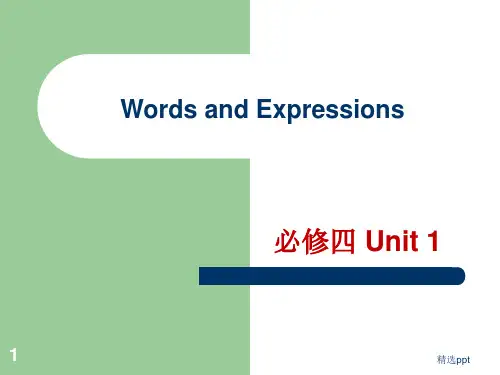
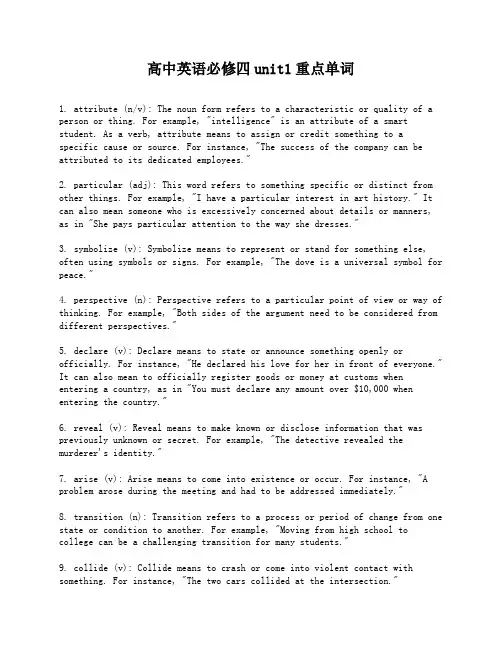
高中英语必修四unit1重点单词1. attribute (n/v): The noun form refers to a characteristic or quality of a person or thing. For example, "intelligence" is an attribute of a smart student. As a verb, attribute means to assign or credit something to aspecific cause or source. For instance, "The success of the company can be attributed to its dedicated employees."2. particular (adj): This word refers to something specific or distinct from other things. For example, "I have a particular interest in art history." It can also mean someone who is excessively concerned about details or manners, as in "She pays particular attention to the way she dresses."3. symbolize (v): Symbolize means to represent or stand for something else, often using symbols or signs. For example, "The dove is a universal symbol for peace."4. perspective (n): Perspective refers to a particular point of view or way of thinking. For example, "Both sides of the argument need to be considered from different perspectives."5. declare (v): Declare means to state or announce something openly or officially. For instance, "He declared his love for her in front of everyone." It can also mean to officially register goods or money at customs when entering a country, as in "You must declare any amount over $10,000 when entering the country."6. reveal (v): Reveal means to make known or disclose information that was previously unknown or secret. For example, "The detective revealed the murderer's identity."7. arise (v): Arise means to come into existence or occur. For instance, "A problem arose during the meeting and had to be addressed immediately."8. transition (n): Transition refers to a process or period of change from one state or condition to another. For example, "Moving from high school to college can be a challenging transition for many students."9. collide (v): Collide means to crash or come into violent contact with something. For instance, "The two cars collided at the intersection."10. establish (v): Establish means to set up or create something, often with a firm or stable foundation. For example, "They established a new company in the field of technology."11. adopt (v): Adopt means to take on or assume a position, policy, or way of life. For instance, "The government decided to adopt new measures to reduce pollution." It can also mean to legally take someone else's child as one's own, as in "They adopted a baby from an orphanage."12. profound (adj): Profound refers to something deep, significant, or thoughtful. For example, "The speaker made a profound impact on the audience with his thought-provoking ideas."13. heritage (n): Heritage refers to the practices, beliefs, traditions, or customs that are passed down from previous generations. For instance, "Hetakes great pride in his Irish heritage."14. embrace (v): Embrace means to accept or support something willingly or eagerly. For example, "She embraced the opportunity to study abroad."15. abandon (v): Abandon means to leave behind or give up completely. For instance, "He abandoned his dream of becoming an actor and pursued a career in business."16. confront (v): Confront means to face or deal with a challenging situation or person directly. For example, "She confronted her fears and overcame them."17. advocate (n/v): Advocate refers to someone who publicly supports or recommends a particular cause or policy. For instance, "He is a strong advocate for animal rights." As a verb, advocate means to publicly support or recommend a particular cause or policy. For example, "The organization advocates for equal rights for all."18. distinct (adj): Distinct means different or separate from something else. For instance, "His voice is so distinct that you can recognize it immediately."19. interpret (v): Interpret means to explain or understand the meaning of something. For example, "Different people may interpret a work of art in various ways."20. crucial (adj): Crucial means extremely important or essential. For instance, "Time management is crucial for success in exams."21. evolve (v): Evolve means to develop or change gradually over time. For example, "Human culture has evolved over millions of years."22. manipulate (v): Manipulate means to control or handle something skillfully or cleverly, often with a hidden agenda. For instance, "He manipulated the evidence to make himself look innocent."23. accommodate (v): Accommodate means to provide space or make room for someone or something. For example, "The hotel accommodated all the guests for the conference."24. manipulate (v): Manipulate means to control or handle something skillfully or cleverly, often with a hidden agenda. For instance, "He manipulated the evidence to make himself look innocent."25.precede (v): Precede means to come before something else in time or order. For example, "The dinner preceded the awards ceremony."26.precede (v): Precede means to come before something else in time or order. For example, "The dinner preceded the awards ceremony."27.hinder (v): Hinder means to prevent or make it difficult for someone to do something. For instance, "The heavy rain hindered their plans to go hiking."28.hinder (v): Hinder means to prevent or make it difficult for someone to do something. For instance, "The heavy rain hindered their plans to go hiking."29. susceptible (adj): Susceptible means easily influenced or affected by something. For example, "She is susceptible to cold weather and easily catchesa cold."30. susceptible (adj): Susceptible means easily influenced or affected by something. For example, "She is susceptible to cold weather and easily catchesa cold."31. acknowledge (v): Acknowledge means to admit or recognize the existence or truth of something. For instance, "He acknowledged his mistake and apologized immediately."32. contradict (v): Contradict means to state something that is opposite to or inconsistent with another statement or belief. For example, "His actions contradicted his words."33. isolate (v): Isolate means to separate or set apart from others. For instance, "The sick child was isolated from the other students to prevent the spread of the infection."34. revenue (n): Revenue refers to the income or money that a company or organization receives from its business activities. For example, "The company's revenue increased by 20% last year."35. invalid (adj): Invalid refers to something that is not legally or officially acceptable or recognized. For instance, "The contract was declared invalid by the court."36. legitimate (adj): Legitimate means something that is legal, valid, or properly authorized. For example, "The organization has legitimate concerns about the new policy."37. reluctant (adj): Reluctant means not willing to do something and showing hesitation or unwillingness. For instance, "He was reluctant to accept the offer."38. suspicious (adj): Suspicious means having doubts about the honesty or reliability of something or someone. For example, "She had a suspicious look on her face when she heard the news."39. predominant (adj): Predominant means being the most common or strongest element in a group or situation. For instance, "English is the predominant language spoken in the country."40. irrelevant (adj): Irrelevant means not related or not logically connected to a particular subject or situation. For example, "The information is irrelevant to the topic we are discussing."41. vague (adj): Vague means not clearly defined or expressed, or not giving enough details. For instance, "His answer was too vague to be helpful."42. substantial (adj): Substantial means large in amount or degree, or significant and important. For example, "The company made substantial profits last year."43. hostile (adj): Hostile means showing strong opposition or unfriendliness. For instance, "The crowd was hostile towards the visiting team."44. imperative (adj): Imperative means something that is very important and must be done. For example, "It is imperative that we finish the project on time."45. consecutive (adj): Consecutive means following one after another in a continuous sequence. For instance, "He won the championship for three consecutive years."46. generous (adj): Generous means being willing to give more than is necessary or expected, especially in terms of money, time, or kindness. For example, "She is known for her generous donations to charity."47. prominent (adj): Prominent means being important, famous, or noticeable. For instance, "He is a prominent figure in the field of science."48. violate (v): Violate means to break or fail to obey a rule or law. For example, "The company violated the safety regulations and faced heavy fines."49. diverse (adj): Diverse means consisting of many different types of things or people. For instance, "The city is known for its diverse culture and population."50. persistent (adj): Persistent means continuing to exist or do something ina determined way, despite difficulties or opposition. For example, "She is persistent in pursuing her goals and never gives up easily."。
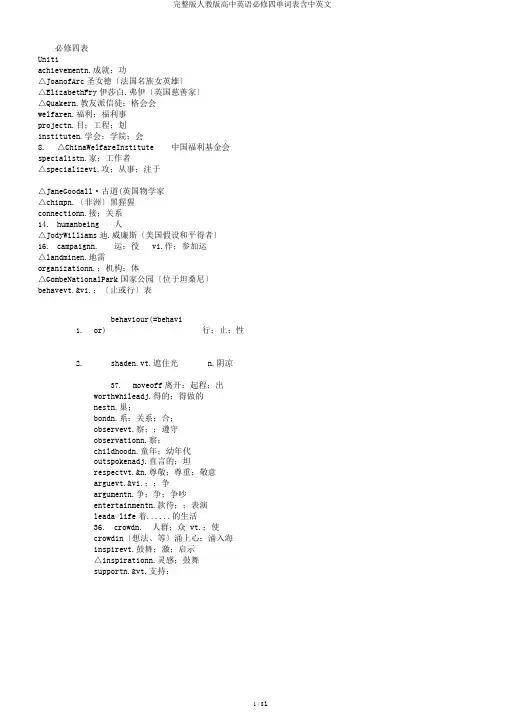
必修四表Unit1achievementn.成就;功△JoanofArc圣女德〔法国名族女英雄〕△ElizabethFry伊莎白.弗伊〔英国慈善家〕△Quakern.教友派信徒;格会会welfaren.福利;福利事projectn.目;工程;划instituten.学会;学院;会8. △ChinaWelfareInstitute中国福利基金会specialistn.家;工作者△specializevi.攻;从事;注于△JaneGoodall·古道(英国物学家△chimpn.〔非洲〕黑猩猩connectionn.接;关系14. humanbeing 人△JodyWilliams迪.威廉斯〔美国假设和平得者〕16. campaignn. 运;役vi.作;参加运△landminen.地雷organizationn.;机构;体△GombeNationalPark国家公园〔位于坦桑尼〕behavevt.&vi.;〔止或行〕表2 1.behaviour(=behavior)行;止;性22.shaden.vt.遮住光n.阴凉37.moveoff离开;起程;出worthwhileadj.得的;得做的nestn.巢;bondn.系;关系;合;observevt.察;;遵守observationn.察;childhoodn.童年;幼年代outspokenadj.直言的;坦respectvt.&n.尊敬;尊重;敬意arguevt.&vi.;;争argumentn.争;争;争吵entertainmentn.款待;;表演leada⋯life着......的生活36. crowdn. 人群;众 vt.;使crowdin〔想法、等〕涌上心;涌入海inspirevt.鼓舞;激;启示△inspirationn.灵感;鼓舞supportn.&vt.支持;41. lookdownupon/on 蔑;瞧不起refervi.到;;参考referto;参考;到audiencen.众;听众;者45. bychance 碰巧;凑巧comeacross〔偶然〕遇;碰△careern.事;生涯raten.比率;速度sicknessn.疾病;心intendvt.划;打算emergencyn.突事件;急情况generationn.一代;一△determinationn.决心;果断kindnessn.仁慈;好意considerateadj.考周到的considerationn.考;体delivervt.送;生〔小孩儿〕;接生;表〔演〕等58. carryon ;持modestadj.虚的;的;适度的Unit2statisticn.〔常用plstatisitcs〕数据;;数字;料sunburntadj.晒黑的strugglevt.&vi.斗争;拼搏;努力decaden.十年;十年期superadj.特的;超的65. △hybridadj.混合的;种的n.交种;混血儿outputn.量;出△strain n.〔植物的〕品种;种cropn.庄家;作物;量69. hungern. ;欲望vt.&vi. 〔使〕disturbingadj.引起的;令人不安的expandvt.&vi.使大;伸展circulatevt.&vi.循;流Vietnamn.越南〔南国家〕thanksto幸;由于;因75. battlen. 役;斗;量;斗争vt.&vi.搏斗;斗ridvt.脱;除去rid⋯of脱;除去78.besatisfiedwith......感到意7 9.freedomn.自由;自主8 0.wouldrather宁愿;宁可8 1.thereforeadj.因;所以;因而117.equipvt.&vi.配;装△sorghumn.高粱grainn.谷物;粮食;粒△peanutn.花生exportvt.&vi.出;出口nationalityn.国籍occupationn.工作;;占△personalityn.性格;个性;人格confusevt.使迷惑;使regretvt.憾;惋惜n.憾;懊悔chemicaladj.化学的;关于化学的△organicadj.有机的;器官的;的△fertileadj.肥沃的;富的△fertilizern.肥料;化肥productionn.生;制造bacterian.〔bacterium的复数形式〕菌pestn.害虫;害;害buildup逐增;建立;开leadto致;〔造成〕后果nutritionn.养;滋养;食物mineraln.物;石discoveryn.;104.focusn. 焦点;中心点vt.集中;聚集focuson集中〔注意力、精力等〕于soiln.土壤reducevt.减少;减keep⋯freefrom/of使......免受〔影响、害〕109.△soybeann.(=soyabean)大豆rootn.根;根源skimvt.;略underlinevt.画底出;summaryn.;摘要;概要114 ment n.;vi.&vt. 表达意;做出△producern.生者;制片人△industrialadj.工的;的Unit3humourn.幽默;滑稽△punchlinen.故事、笑等中的妙;关△verbaladj.口的△nonverbaladj.不用言的△mimen.△CharlieChaplin理.卓林〔美国喜大〕△EdwardLear德.里〔英国作家、画家〕comedyn.喜剧△VictorHugo维克多.雨果〔法国文学家〕126.uptonow 直到现在△brightenvt.使更愉快;使更有希望△depressedadj.忧愁的;沮丧的129.contentadj. 满足的;满意的n.满足vt.使满足130.feel/becontentwith 对......满足performern.表演者;演出者astonishvt.使惊诧astonishingadj.令人感到惊诧的fortunateadj.幸运的;吉利的unfortunatelyadv.不幸地badlyoff穷的;缺少的△teensn.十几岁〔13至19岁的年龄〕ordinaryadj.平常的;普通的boredadj.厌烦的△subtleadj.微妙的;精巧的;技艺精湛的entertainvt.&vi.使欢乐;款待△entertainingadj.愉快的;有趣的△charmingadj.迷人的;有魅力的△trampn.流浪汉;行乞者throughoutprep.普及;贯穿adv.到处;始终;全部homelessadj.无家的;无家可归的moustachen.小胡子wornadj.用旧的;用破的;破烂的△worn-outadj.磨破的;穿旧的△stifflyadv.僵硬的failuren.失败〔者〕△optimismn.乐观;乐观主义153.overcomevt.&vi.(overcame,overcome) 战胜;克服△underdogn.失败者;处于劣势的一方△snowstormn.暴风雪leathern.皮革pickout挑出;区分出△lacen.饰带;花边;鞋带cutoff切断;断绝chewvt.&vi.嚼碎;咀嚼〔食物〕△mouthfuln.一口;满口△enjoymentn.享受;欢乐;乐趣convincevt.使信服convincingadj.令人信服的165.directvt.&vi.导演;指示;指挥adj. 直的;直接的;直率的starin担任主角;主演△Oscarn.奥斯卡outstandingadj.突出的;显著地;杰出的Switzerlandn.瑞士〔欧洲中部国家〕△confidencen.信心;信念△costumen.服装;戏装gesturen.姿态;手势vi.做手势particularadj.特殊的;特别的n.细节;细目particularlyadv.特殊地;特别地occasionn.时刻;场合budgetn.预算;开支actressn.女演员178.slidevt.&vi. 〔使〕滑动;〔使〕滑行n.滑动;滑;幻灯片amusevt.使发笑;使愉快△amusingadj.好笑的;愉快的pancaken.烙饼;薄饼explanationn.解释;讲解;说明detectiven.侦探△SherlockHolmesn.夏洛克.福尔摩斯mountainousadj.多山的;山一般的186.whispern. 耳语;低语vt.&vi. 低语;小声说vastadj.巨大的;辽阔的△rhythmn.节奏messn.脏或乱的状态reactvi.做出反响;回应porridgen.粥;麦片粥drunkadj.醉的Unit4statementn.陈述;说明greetvi.&vt.迎接;问候representvt.代表;象征associationn.社团;联系;联想dormitoryn.宿舍canteenn.食堂flightn.飞行;航班curiousadj.好奇的curiouslyadv.好奇地△Garcia加西亚〔姓〕Colombian.哥伦比亚〔南美洲国家〕204.approachvt.&vi. 接近;靠近;走进n.接近;方法;途径cheekn.面颊defendvt.防御;保卫defendagainst防御defencen.防御majoradj.主要的210.misunderstandvt.(misunderstood,misunderstood) 误解;误会misunderstandingn.误解;误会△AkiraNagata△AhmedAziz艾哈迈德.阿齐兹Jordann.约旦〔西亚国家〕215.△DarleneCoulon达林.库隆216.dashvi.猛冲;突进217.adultn.成人;成年人adj.成人的;成熟的△simplyadv.简单地;只△Muslimn.&adj.穆斯林〔的〕;伊斯兰教信徒〔的〕spokenadj.口语的unspokenadj.未说出口的;非口语的△posturen.姿态;体态Spainn.西班牙〔欧洲国家〕Italyn.意大利〔欧洲国家〕likelyadj.可能的belikelyto很可能;有希望ingeneral总的来说;通常crossroadsn.十字路口△employeen.雇员△frownvi.皱眉;蹙额△misreadvt.〔misread/misread〕读错;误解facialadj.面部的functionn.作用;功能;职能vi.起作用;运转easen.安逸;舒适vt.减轻〔痛苦、忧虑〕atease舒适;快活;自由自在trulyadv.真实的;真诚的;真正的falseadj.错误的;假的angern.怒气;怒火loseface丢脸240.turnone’sbackto背对;背弃fistn.拳头yawnvi.打哈欠△respectfuladj.恭敬的subjectiveadj.主观的hugvi.&vt.拥抱rankn.等级;军衔cassetten.磁带Unit5themen.题目;主题曲△CamelotPark卡默洛特公园〔位于英国〕centraladj.中心的;中央的△CentralPark中央公园〔位于美国纽约〕△Dollywoodn.多莱坞〔公园名,位于美国〕variousadj.不同的;各种各样的cartoonn.漫画;动画片255.befamousfor 以......而闻名△roller coastern.过山车whicheverpron.无论哪一个;任何一个△piraten.海盗;盗版△fairytale神话故事;童话fantasyn.梦想;怪念头amusementn.消遣;娱乐〔活动〕262.swingn.秋千;摇摆vt.&vi.(swung,swung) 摇摆;摆动attractionn.有吸引力的事物;吸引nowonder难怪;缺乏为奇tourismn.旅游业266.wherever adv.&conj. 无论在什么地方;各处uniqueadj.独一无二的;仅有的carpentern.木匠△craftsmann.匠人;能工巧匠enginen.引擎;发动机△baldadj.秃头的272.preserve vt.保存;保存n.保护区lengthn.长度deedn.行动;事迹△knightn.骑士;爵士276.bemodelledafter 根据......模仿;仿造277.△MerlintheWizard魔术师梅林278.sword n.剑△joustvi.〔指中世纪骑士〕骑着马用长矛打斗tournamentn.锦标赛;联赛settlern.移民;殖民者athleticadj.运动的translatorn.译员;翻译minorityn.少数;少数民族clothn.布△Fluoroscopen.观测未来〔公园名,位于法国〕junglen.丛林△diver n.潜水员creaturen.生物;动物sunlightn.阳光△T-Rexn.霸王龙292.advance vt.&vi 前进;促进;提前n.前进;进步293. inadvance 提前advancedadj.高级的;先进的brandn.商标;牌子296.getcloseto 接近297 etolife 活泼起来outingn.外出admissionn.允许进入;入场费;成认shuttlen.往返汽车;航天飞机freewayn.高速公路souvenirn.纪念品sneakern.运动鞋brochuren.〔作宣传介绍用的〕小册子;指南。
Unit1 Using Language 重难点词汇详解重点词汇1.by chance碰巧;凑巧教材原文By chance I came across an article about a doctor called Lin Qiaozhi, a specialist in women's diseases.很偶然地,我看到了一篇关于林巧稚大夫的文章,她是一位妇科病专家。
经典例句①I heard them having a heated argument by chance when I passed by.当我路过时,我碰巧听到他们在激烈地争论。
②I am more than glad to have a chance to give the lecture here.我非常高兴有机会在这里做报告。
③There is no chance that he will change his mind.他不可能改变主意。
④You take a chance on the weather if you holiday in the UK.在英国度假,只有赌天气了。
⑤The chances are that the experiment will be successful because they've madegreat efforts.因为他们做出了很大努力,所以实验成功的可能性很大。
⑥Do you think there is a chance that you could be persuaded to change your mind?你觉得你有可能被说服以至改变自己的决定吗?⑦The chances are you won't have to pay.你可能不用付钱。
e across(偶然)遇见;碰见教材原文By chance I came across an article about a doctor called Lin Qiaozhi,a specialist in women's diseases.很偶然地,我看到了一篇关于林巧稚大夫的文章,她是一位妇科病专家。